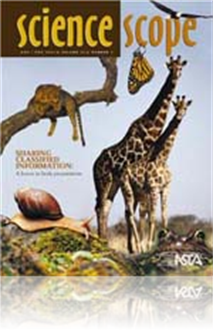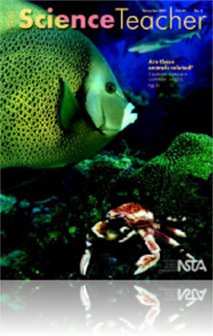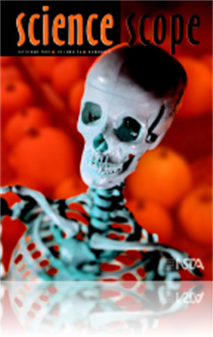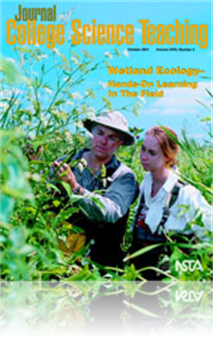All Resources
Journal Article
Note Sheets: A Reliable Predictor of Success?
Students in a large introductory-level biology course brought one page of notes to their exams. The authors scored these note sheets for their format and content. Student performance on exams showed a very limited correlation with the format or conte...
Journal Article
Teachers can engage their students in lively presentations that demonstrate their understanding of biological classification. Using a cooperative learning approach, student groups research and apply their knowledge of each level of classification thr...
Journal Article
Editor's Note (November/December 2001)
Science and Children’s editor shares thoughts about the horror of September 11, 2001, and its immediate effect on children in classrooms and its effect on what should happen in our classrooms now and in the future....
Journal Article
Soil Studies: Applying acid-base chemistry to environmental analysis
To help secondary students understand acid-base chemistry, two educators design experiments focusing on acid rain’s effect on soil. Students conduct experiments to measure the pH of rainwater and soil before and after rainwater has filtered through...
Journal Article
Astrobiology: Discovering New Worlds of Life
This article describes the fascinating new field of astrobiology—a multidisciplinary approach in which scientists apply their knowledge of deep-sea environments to examine the origin of life on Earth and determine the possibility of extraterrestria...
Journal Article
Alternative Assessment: A monthly portfolio project improves student performance
As an alternative method of assessment, students create portfolios by submitting monthly entries that demonstrate and expand their understanding of science concepts. Teachers can also use the portfolios to assess the success of their teaching practic...
Journal Article
The Case Study: The Cheerleader and the Football Player
This is a classic engineering problem involving pulleys. It is suitable for any basic class where Newtonian mechanics are discussed. The objective of the case is straightforward: to teach the mechanical principle of the pulley. The story attempts to ...
Journal Article
Scope on the Skies: All about occultation
This column focuses on astronomy throughout the year. In this month’s issue learn about occultation, or hiding, that occurs when the Moon, in this case, blocks our view of a planet or star other than the Sun. Knowing when an occultation will occur ...
Journal Article
Gardening in a neglected schoolyard became a catalyst for schoolwide science learning in an urban school in Detroit. Not only did students learn about plant requirements and care for numerous flowers and trees, but they also discovered the motivation...
Journal Article
Expanding Students’ Professional Horizons: A View from the Earth and Space Sciences
Teachers can use this inspiring article to introduce students to careers in the Earth and space sciences. The authors discuss the interdisciplinary nature of the geosciences, job opportunities and prospects, and their relevancy to many economic and e...
Journal Article
Internet Courses: Are They Worth the Effort?
To investigate the effectiveness of an Internet-delivered course, one group of biology students learned the course material employing Internet resources while a second group attended a traditional, lecture-based class. The authors, comparing student ...
Journal Article
Middle school students in a rural Illinois school visualized and learned more about landforms after making a relief model from a topographic map. They achieved a deeper understanding of topography as the representation of the features and configurati...
Journal Article
Favorite Demonstration: Illustrating Heterochrony and Heterotopy
This article describes an inexpensive, simple method using balloons to demonstrate heterochrony and heterotopy in the classroom. The method can be used to supplement lectures and assigned readings for a course, especially in cases where heterotopy is...
Journal Article
Editor's Corner: The Standard Classroom
The Science Teacher’s editor shares thoughts on the current issue....
Journal Article
Is Inquiry the Answer? Using action research to analyze student performance and opinion
Action research is one of the most informative methods of investigating issues of concern within the educational community—it not only increases awareness of a particular issue but also allows students to discover important information about how t...











